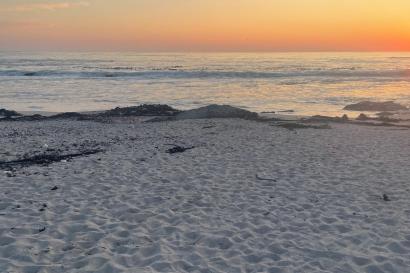
Molo means “hi” and Uyaphi means “where are you going” in isiXhosa, mama Mpumi taught us this during our homestay at her house last weekend. Although it only lasted a weekend we had many opportunities to immerse ourselves in the culture.
A group of 2-3 individuals were matched with a local household in the suburb of Gugulethu (or Gugs)- home to many of the city’s working population. It was initially built to hold migrant workers moving from Cape Town. From the surface it’s a vibrant, lively, and colorful area but some living conditions of the locals prove otherwise. Family size in each household roughly ranges from 1-7 people. While some houses are painted in bright highlighter colors others are as dreary as a storm cloud about to give out. Children run like scattered ants filling the entire area with infectious laughter.

Sierra and I were warmly welcomed into mama’s Mpumi’s bright pink house. She offered us bread & butter with tea immediately upon entry. After a quick chit chat it was time for dinner. A hearty bowl of chicken and gravy made in the Cape Malay style, steamed carrots, sweet potatoes, lentils, and salads were served with the traditional Pap. Although I started out strong my pace tragically fell in keeping up with the quantity of food on my plate. A small dimly lighted lantern sat on the wooden dinner table creating shadows of all shapes and forms. In the background African Christian music hummed from the radio. Outside, the determined rain burst into and outcry, conversations flowed for hours, and night fell into a blanket of darkness.
Staying at Mama’s house added another dimension to my understanding of the South African culture. From the food to the dancing every little experience collectively allowed for an immersion that I had longed for. Relationships developed out of this experience catalyzed looser conversations that wouldn’t have been possible otherwise. Increased levels of comfort further assisted our learning process.

The next day we visited Mzoli’s- a popular butchery & grill and nightlife. It has gained increasing traction from tourists over the past few years. Music pumped out of this place reaches even the tiniest corners of the neighborhood, it’s seemingly never ending. How do people living in this area sleep at night? How do they react to the constant rush of foreigners into and around their living quarters? Despite my heightened mental wonderings it was a very eventful afternoon and we all had great fun losing ourselves in the food and music.
Leaving at the end of the day was somewhat difficult as few of us had developed an attachment to Gugulethu’s people (children and adults alike) and their ways. I wished to stay longer but had to constantly remind myself that we’re constrained by the ties of a summer program. We also have to keep in mind that what we experienced is not the whole picture of Gugs. Our host families accommodated us very well but most people in this area don’t have the luxuries we experienced. This is where it helps to have a critical eye. We had beds of comfort, bathrooms, and delicious food on the table. Majority of people in Gugulethu do not. Most of us would not even be able to last a night in those circumstances. Overall we got a perfect balance of reality with our homestays and a chance to explore a vibrant community from its religion to food.

Sangya Gyawali
<p>My name is Sangya Gyawali. I am a rising senior at the University of Pittsburgh and an Anthropology major and a Chemistry minor. I am an adventure enthusiast and a real foodie. I hope to foster my love for cultures and people this summer while studying abroad in Cape Town, South Africa. Join me as I capture new experiences from different perspectives through words and photos.</p>









